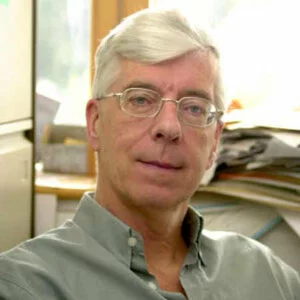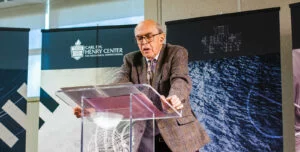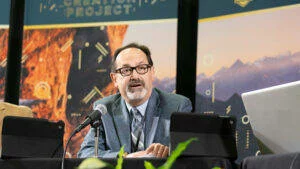 On the day of Pentecost, in one of the most dramatic sermons ever preached, Peter proclaimed that “You killed the author of life” [Acts 3:15]. Authorship is a powerful metaphor for referring to the Christological creation, that wonderful created order in which we find our existence.
On the day of Pentecost, in one of the most dramatic sermons ever preached, Peter proclaimed that “You killed the author of life” [Acts 3:15]. Authorship is a powerful metaphor for referring to the Christological creation, that wonderful created order in which we find our existence.
The New Testament insists that it is through Christ and in Christ that the whole material world finds its being. All things exist by the creative and sustaining power of the Lord Jesus, the Word of God. “Through him all things were made; without him nothing was made that has been made” (John 1:3).Emphasis added. In Colossians 1, one of the most amazing passages in the whole of the New Testament, Paul speaks of the Son as being “the image of the invisible God, the firstborn over all creation” (Col. 1:15), and then immediately goes on to say: “For by him all things were created: things in heaven and on earth, visible and invisible, whether thrones or powers or rulers or authorities; all things were created by him and for him. He is before all things, and in him all things hold together” (Col. 1:16–17).Emphasis added.
The Author of Creation
In other words, the complete created order, in all its breadth and diversity, goes on existing by the same divine Word, the Lord Jesus, who brought everything into being in the first place. The point is further underlined by the writer to the Hebrews when he writes that “The Son is the radiance of God’s glory and the exact representation of his being, sustaining all things by his powerful word” (Hebrews 1:3).Emphasis added. The New Testament insists that Christ is intimately involved in creation in the same kind of way that we find God as author of creation in the Old Testament, and it is this that powerfully highlights Christ’s divinity.God is the one “for whom and through whom everything exists” (Hebrews 2:10). If God did not keep on willing the created order to exist by his powerful Word, then it would stop existing.
The New Testament insists that Christ is intimately involved in creation in the same kind of way that we find God as author of creation in the Old Testament, and it is this that powerfully highlights Christ’s divinity. Page after page of the books of Psalms, Isaiah, and Job remind us that God creates and sustains the smallest details of biology, including making grass grow for cattle (Ps. 104:14), supplying food for lions who “roar for their prey and seek their food from God” (Ps. 104:21) and “for the raven when its young cry out to God” (Job 38:41). The Hebrew word bara’ used for ‘create’ only when God is the subject of the verb, is used to refer to God’s complete involvement in the common daily processes of animal life and death (Ps. 104:29–30). God is the author of creation.
So descriptive phrases such as ‘evolutionary creationism’ or ‘theistic evolution’ are reminders of this fact—that all the processes of life are sustained moment by moment by God as author. The nomic regularity (law-like behavior) of the material world—which is what makes science possible—would not be the way it is without the Creator God who keeps it that way. We would have no reason to believe that an electron on this side of the universe would behave in the same way as an electron on the other side of the universe, were it not for the faithfulness of God in guaranteeing the coherence and reproducibility of the properties of matter.
That is why “since the creation of the world God’s invisible qualities—his eternal power and divine nature—have been clearly seen, being understood from what has been made, so that men are without excuse” (Rom. 1:20). Not because people down the ages have known about electrons (!), but because anyone can look around them and see the wonders of the created order. So the psalmist David proclaims that “The heavens declare the glory of God; the skies proclaim the work of his hands. Day after day they pour forth speech; night after night they display knowledge” (Ps. 19:1–2). “The earth is the LORD’s, and everything in it . . .”(Ps. 24:1).Emphasis added.
Can Authors Intervene?
This is why the language of God’s ‘intervention’ is inappropriate when we are describing the normal moment-by-moment activity of God in sustaining the created order in all its completeness. For how could the author ‘intervene’ in his own book? The language doesn’t make sense. The theologians who reflected on evolution soon after the 1859 publication of Darwin’s Origin of Species were quick to pick up on this point. For example, the Revd Aubrey Moore (1843-1890), a Fellow of St John’s College, Oxford, and Curator of the Oxford Botanical Gardens, claimed that there was a special affinity between Darwinism and Christian theology, remarking that “Darwinism appeared, and, under the guise of a foe, did the work of a friend.” Aubrey Moore, “The Christian Doctrine of God” in Lux Mundi: A Series of Studies in the Religion of the Incarnation, ed. C. Gore, 12th edn. (London: John Murray, 1891), 73. The reason for this affinity, claimed Moore, was based on the intimate involvement of God in his creation, for:
There are not, and cannot be, any Divine interpositions in nature, for God cannot interfere with Himself. His creative activity is present everywhere. There is no division of labor between God and nature, or God and law . . . For the Christian theologian the facts of nature are the acts of God. Denis R. Alexander, Rebuilding the Matrix: Science and Faith in the 21st Century (Oxford: Lion, 2001), 177.
Moore welcomed evolution as restoring a proper Christian doctrine of creation in which a transcendent God is intimately involved both in its coming into being as well as its ongoing existence.
It should now be clear that if someone wishes to see the evidence of God’s ‘detectable divine actions’ demonstrated in the world around them, then they should first look at the book taken as a whole. For the signs of God’s authorship are there for all to see—in the intelligibility of the world that makes science possible; in its vastness; in its nomic regularity; in its order and beauty; in the constrained and orderly way in which the evolutionary process proceedsThe aim of science—whether all scientists see things this way or not—is to describe and understand the workings of the created order as best we can. (the notion that evolution is a chance process is a myth)Denis R. Alexander, Is There Purpose in Biology? (Oxford: Lion, 2018); and in the emergence of human persons with free will that enable them to respond, or not, to God’s love. Such looking at the world should be enough to convince them of God’s ‘eternal power and divine nature,’ because rationally only a supremely powerful and transcendent God could be the author of this huge, amazing and complex universe.
The aim of science—whether all scientists see things this way or not—is to describe and understand the workings of the created order as best we can. So scientists do have the advantage of being able to explore the wonders of God’s creation in greater depth and detail than others. Divine action should be even more apparent to them than to non-scientists given such an advantage. For example, the existence of the great drama of evolutionary history makes much better sense if perceived within a theistic framework—otherwise why would minds emerge from such a process that have the ability to write down mathematical equations that describe the properties of the universe so accurately and so profoundly? Unless those equations were true, there would be no evolutionary history.
None of this entails that the language of ‘intervention’ is inappropriate when describing the many other ways in which God interacts with the world. But the language makes best sense when God intervenes in the lives of people, and therefore in history. God intervenes in the lives of believers in answer to prayer, so that things happen that would not have happened otherwise had we not prayed (2 Sam. 24:25; 2 Chr. 7:12; Ezra 8:23; Jas. 5:15—and much more!). God sometimes intervenes in the lives of believers in miraculous ways, which can involve God arranging the created order in a special way to bring about His will, including miracles of timing (Exod. 14:21; Josh. 3:15–17). A biblical miracle has been defined as “a sign of God’s special grace in a particular historical-religious context.”Denis R. Alexander, “Miracles and Science,” Faraday Paper 20 (2017). Available from www.faraday-institute.org. In the most important intervention in history, God raises Jesus from the dead and the power of sin to generate eternal death is destroyed forever.
So evolutionary creationism tells us about the ‘normal backcloth’ of the created order, describing God’s daily providential up-holding of everything that exists. This is why the various Hebrew and Greek words translated as ‘miracle’ in the Bible are virtually never used to refer to God’s work in creation. Instead, the idea (albeit not the word) of God’s ‘intervention’ is preserved for God’s work in the lives of people and their particular circumstances. But thankfully everything becomes joined up when we remember that it is through God’s providential ordering of the evolutionary process that we humans finally emerge to enjoy God’s interventions in our lives as we walk with Him along life’s way.







Comments
Be the first one to make a comment!